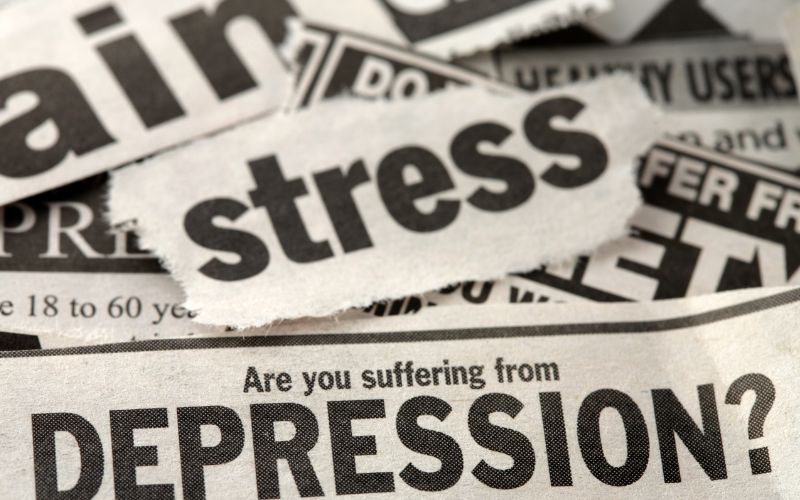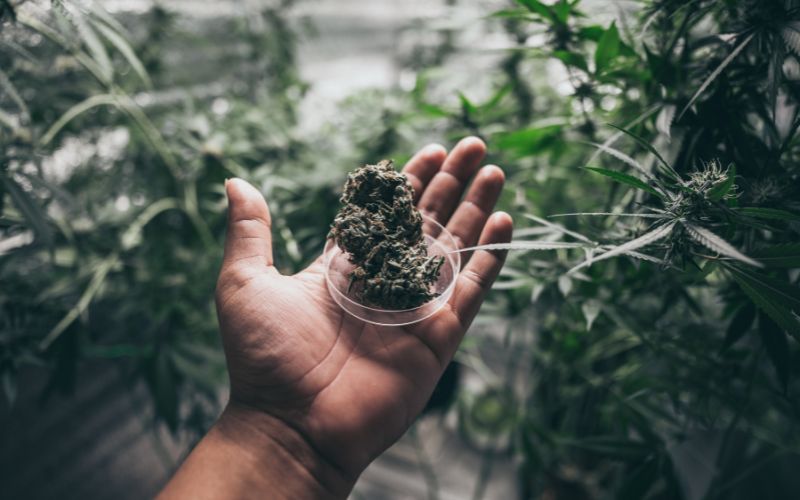Are you asking yourself, “Is marijuana a depressant?” Marijuana is one of the most commonly used drugs within the United States and has been legalized in some states while it remains illegal in others. One question that is often asked may be, is marijuana a depressant, because there are many cases where people drink alcohol, smoke cigarettes, and use other substances to cope with their depression.
There is no doubt that marijuana has some potential risks associated with its use. Still, overall it appears to be much safer than other substances commonly used to self-medicate depression.

In fact, a growing body of research suggests that cannabis may actually be an effective treatment for depression. One study published in the Journal of Affective Disorders found that subjects who smoked cannabis had significantly lower levels of depressive symptoms than those who didn’t smoke.
So while marijuana may not be a perfect solution for depression, it seems to be much safer and more effective than other substances commonly used to self-medicate. If you or someone you know is struggling with depression, it may be worth considering marijuana as a potential treatment option.
Is Marijuana a Depressant? : The basics
There are a few things to keep in mind if you’re thinking about using marijuana to treat your depression. First, it’s important to be aware that marijuana can have different effects on different people. While it may help some people feel more relaxed and uplifted, it can make others feel anxious or paranoid. It’s important to start with a low dose and increase gradually until you find the best dose.
Second, marijuana can interact with other medications, so it’s important to talk to a medical professional before you start using it. Some medications, such as antidepressants and anti-anxiety drugs, can interact with marijuana and cause negative side effects.
`Additionally, smoking cannabis can make you feel drowsy or sleepy and can give you the ‘munchies’ (increased hunger). It can make some people feel anxious, confused, and paranoid, especially if they take a strong dose. Eating cannabis takes longer for the effects to start, but they can last longer. Drinking cannabis tea will also give you a more relaxed feeling than smoking it, but the effects will last for a shorter time.
Marijuana has some benefits, such as reducing anxiety and relieving pain, but it also has risks. It’s essential to weigh up the pros and cons before starting treatment with Marijuana. If you have any history of mental health problems or are pregnant or breastfeeding, you should speak to your physician before using cannabis.
Finally, Marijuana is still illegal in some states, so you need to check the laws in your area before you start using it. If you live in a state where marijuana is not legal, you may be at risk of getting arrested or fined if you’re caught using it.
Though Marijuana is often thought of as a recreational drug, there is growing evidence that it may also have therapeutic benefits for a variety of medical conditions, including depression. If you’re considering using Marijuana to treat your depression, it’s important to talk to your doctor first to understand the risks and benefits. With more research, we may better understand the potential of Marijuana as a treatment for depression and other mental health conditions.
Does Marijuana help with depression?
Though Marijuana is often associated with inducing a feeling of happiness and well-being, some people are wondering if it could be used to treat depression. Anecdotal evidence suggests that Marijuana may help some people suffering from depression, but there is little scientific evidence to support this claim. In fact, Marijuana may actually have the opposite effect on some people and can cause them to feel more depressed.
While more research is needed, many people have found relief from their depressive symptoms by using Marijuana. Here’s what you need to know about using Marijuana to treat depression-the benefits, the risks, and how to get started.
Depression is a serious medical condition that can cause a wide variety of symptoms, including feelings of sadness, hopelessness, anxiety, and fatigue. While there are many effective treatments for depression, some people find that they don’t respond well to traditional therapies. For these people, alternative treatments, such as medical Marijuana, may be worth considering. Now you can see why it’s tricky when asking is marijuana a depressant.
Marijuana is thought to work on the brain in a similar way to antidepressants. It helps to regulate the production of neurotransmitters, such as serotonin and dopamine, which are believed to play a role in depression. THC, the main psychoactive component of Marijuana, is also known to have mood-boosting effects.

In addition to its antidepressant properties, Marijuana has also been shown to have anti-anxiety and anti-inflammatory effects. This means that it could potentially help to relieve some of the physical symptoms of depression, such as pain and insomnia.
The risks associated with marijuana use
Marijuana is a drug used worldwide for centuries, but its use has been rigorously restricted in recent decades, especially in Western nations. In recent years, the legalization of Marijuana has become more widespread, and this may have led some people to believe that there are few risks associated with its use.
However, even as medical research into the drug’s benefits has begun to be more widely shared, it’s important not to forget that there are many potential risks associated with using Marijuana. This article will explore some of these risks- the most prominent being health complications- and why it’s so important to take them seriously before starting any type of treatment involving Marijuana.
In some cases, Marijuana may be used as a way to self-medicate depression or anxiety. However, Marijuana can actually make these conditions worse. One of the ways it does this is by causing paranoia and feelings of panic or anxiety. This is because THC, the primary psychoactive ingredient in Marijuana, interacts with the brain’s hippocampus, which is responsible for controlling emotions.
Another significant risk associated with marijuana use is impaired judgment. This can lead to risky behaviors, such as driving while under the influence of the drug. This is especially dangerous because Marijuana can stay in your system for up to 30 days after you use it, which means that you could be impaired long after the high has worn off.
Marijuana can also have negative effects on your respiratory system, leading to chronic bronchitis and other health problems. Because Marijuana is still a relatively new treatment for depression, there is not much research into its long-term effects. However, it’s important to be aware that there may be risks associated with using Marijuana over a long period of time.
Asking is marijuana a depressant is interesting because it seems to have opposite effects on different people. Some people find that it helps them to treat their depression while others find that it makes their depression worse.
While there is still much unknown about the potential benefits of medical marijuana for depression, the evidence so far is promising. Before starting any type of treatment involving Marijuana, it’s important to talk to your doctor about the risks and benefits involved.
Be sure to let them know if you have any history of mental health problems, as this could make the risks associated with marijuana use higher. They can help you to understand the risks and benefits and determine if Medical Marijuana is right for you.
How to ask your doctor, Is marijuana a depressant?
Many people who use medical Marijuana find it to be a more effective treatment than prescription drugs. Some doctors are now recommending medical Marijuana as an alternative for their patients. While other doctors are reluctant to prescribe the medication because they are not familiar with its effects.
However, research shows that cannabis is a safe and effective treatment option for many people. If you’re considering using medical marijuana to treat your condition, talk to your doctor about it. They may be able to provide you with the information you need to make an informed decision. Thanks for reading!

